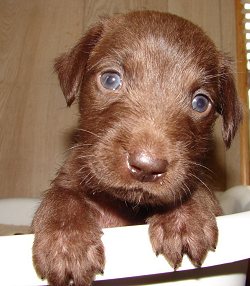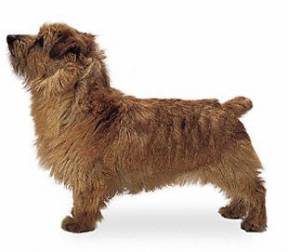Height: 9-12 inches
Weight: 11-12 lbs.
Life Span: 13-14 yrs.
Breed Group: Terriers
Overview
Norfolk terriers are great small dogs -- with large-dog attitudes. They
are high-spirited, assertive, energetic, and bark at the arrival of strangers.
Norfolks are very playful and love children if socialized with them at an
early age and treated gently. They learn quickly in obedience class as long
as their exuberance is gently and patiently controlled.
They get along with other animals, including cats, though they may not be
able to resist chasing them sometimes.
Indefatigable in the field, Norfolks are always ready to go into tunnels
and holes to "bolt" (run out) a fox or tackle other small animals. For this
reason it is important to keep Norfolks on a leash when walking.
Appearance
The Norfolk's small ears fold forward and are carried close to the cheek.
The outercoat is short, wiry, and straight; the undercoat is shorter.
Norfolks come in all shades of red, wheaten, black and tan, or grizzle,
sometimes with dark points.
Grooming & Exercise Needs
Norfolks need a quick brushing and combing once or twice a week and clipping
twice a year.
They need a lot of exercise. Long walks, runs, or hikes are ideal. They
should not be kept alone in a fenced yard because they will dig or bark
excessively.
Origins
Norfolks originated in England in the 19th century, where they were used
to control the rat population and hunt foxes. They became popular as pets
with students at Cambridge University.
Special Alerts
Breed-related health concerns include summer eczema.
Reference: AKC - American Kennel Club |

